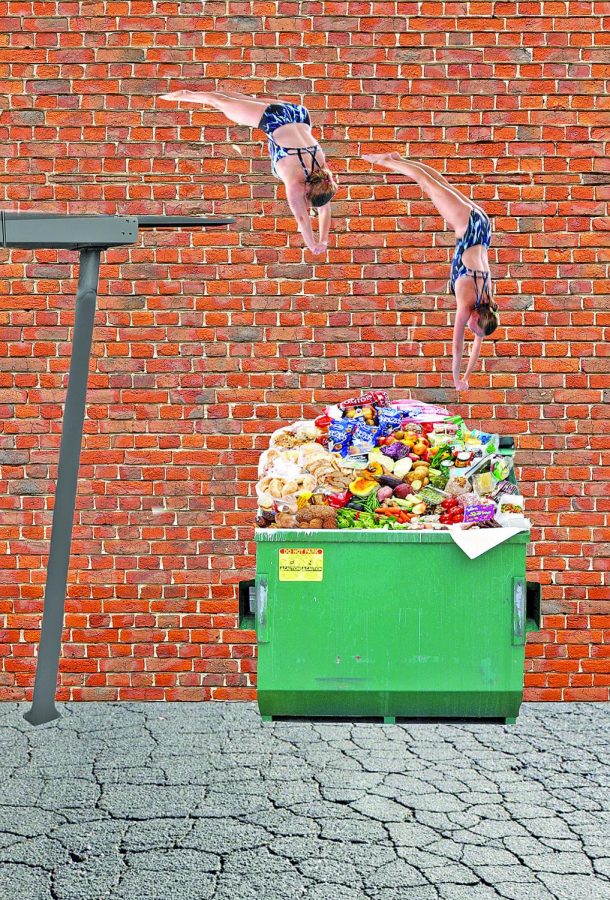Confessions of a dumpster diver
Diving for the good stuff
Editor’s Note: Basement Medicine does not condone or suggest dumpster diving. If you are desperately in need of food, please consider options like JSC’s weekly student food pantry or the local Johnson town food shelf.
The names of those interviewed have been changed in this story to protect the identities of the guilty.
Among the variety of sustainability movements making waves around the world, one in particular has caught the attention of many local college students. To help reduce waste at local grocery stores and save money, students are going out dumpster diving in search of fresh produce and delicious treats.
Fresh fruits and veggies might not be the first thing on your mind when you think of dumpsters, but you would be surprised by the amount of untainted food grocery stores leave out back, not even inside the dumpsters.
JSC Junior, being identified as Liam, says, “When I say, ‘Dumpster Diving’ I’m not literally diving into dumpsters. I’m going to the back of grocery stores and getting food that they are leaving out. I’m not sure if they are leaving it out for me, but I’m taking it.”
Many grocery stores separate their waste, throwing similar products into their own bins. This makes dumpster diving simple and quick when you know what you’re looking for. “If I’m just getting out of barrels or compost, it’s mostly fresh fruits and veggies, so bell peppers, every kind of pepper you can imagine, different kinds of potato, cauliflower, leafy greens, spinach, arugula, kale, pumpkins, gourds, fruits, oranges, and bags of onions,” says Liam. “If you go into the dumpsters themselves, you can get things like bags of bread, frozen pizzas, premade sandwiches, deli salads, anything!”
Liam says his favorite find is not-so-everyday fruits and veggies. “I’ll get things like pomegranates, pumpkins, or scallions,” says Liam. “The things that most people don’t use every day for cooking are cool to find.”
“I think my best [dumpster diving] find was two pints of Ben and Jerry’s,” says JSC sophomore, going by Amelia. “I thought it was bait for a trap.” Sometimes you’ll find things too good to be true, like my favorite find: a case of beer disposed of because one of them exploded in the box.
Instances like that can definitely make you paranoid due to the grey zone of the law in which dumpster diving exists. Once an item is disposed of in the trash, it is no longer private property, but you are trespassing on private property when rummaging through the bins. “I’m not really scared of getting caught because what are they going to do?” says Amelia. “We’re taking out their trash.”
Dumpsters aren’t always the cleanest place to go shopping, but the separation methods used by most grocery stores keeps most unpackaged food in their own box or bin. That means most produce is in a box or bin completely separate from the actual trash. “Sometimes the fruits and veggies will have other fruit and veggie matter on them, but there’s never meat contamination, or gluten contamination,” Liam says. “It can definitely be gross!” says Liam. “I bring latex gloves every time I go. I also bring a flashlight so you can see what you’re touching. It’s gross . . . and smells pretty bad sometimes, but again, a lot of what I’m doing isn’t crawling through dumpster goo. It’s just going behind stores, getting what I need out of a box and putting it into my grocery bag and leaving. It’s like grocery shopping.”
Although many JSC dumpster divers started within the past year, the movement isn’t anything new. “When I’m talking about dumpster diving, you’re getting into the belief system of Freegans — a movement that is spreading rapidly, but isn’t necessarily super common at the moment,” says Liam. “It’s not just about food… it’s getting all waste. Getting everything you need in life from the ‘dumpsters.’”
So what attracts people to this Freegan activity? It’s a massive money saver and helps promote less waste while protecting fresh food from ending up in a landfill. “The U.S. throws away billions of dollars a year in food,” says Liam. “A third of the food produced in the world is thrown away, so it’s things like that which make want to help.” Other divers participate for less serious reasons. “I like it because it’s the closest thing I can get to being a raccoon,” Amelia says.
“It’s a movement,” says Liam. “There’s blogs, there’s vlogs, there’s newsletters, there are endless resources. It’s 2017, so if you want to know anything about it, go on Google and quick search, ‘Freeganism’ or ‘Dumpster Diving.’ A lot of it is word of mouth because people know other people who do it, and then they get hooked on it. It really is addictive! It’s super fun and a great rush!”






